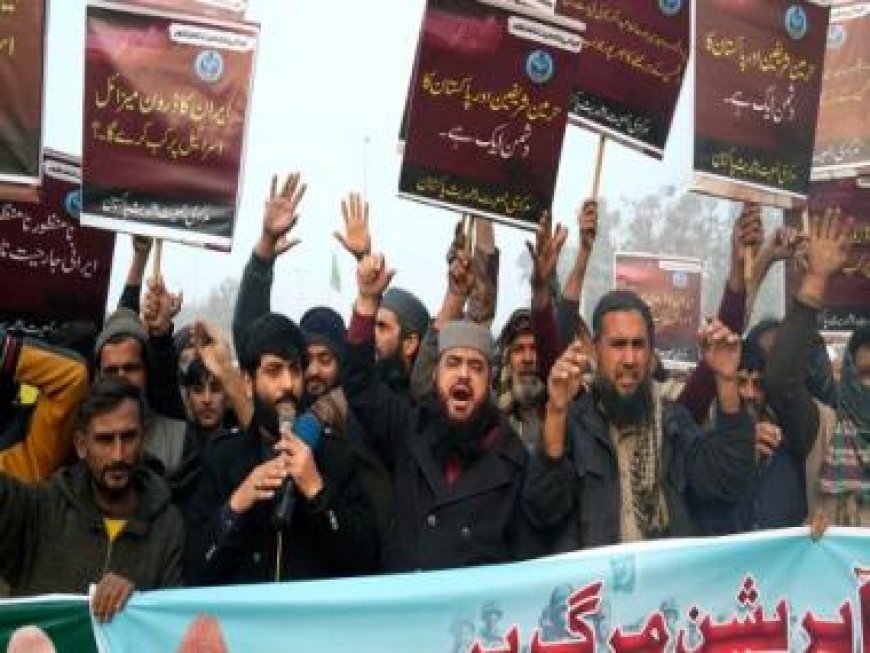Pakistan, Iran agree to de-escalate tensions after tit-for-tat strikes
Pakistan, Iran agree to de-escalate tensions after tit-for-tat strikes

Pakistan and Iran “agreed to de-escalate” tensions and expressed their willingness to work with Iran on “all issues” in a call between their foreign ministers on Friday after both countries exchanged drone and missile strikes on militant bases on each other’s territory.
The tit-for-tat strikes by the two countries are the highest-profile cross-border intrusions in recent years and have raised alarm about wider instability in the region since the war between Israel and Hamas erupted on Oct. 7.
A statement from Pakistan’s foreign office said Foreign Minister Jalil Abbas Jilani had spoken to his Iranian counterpart, Hossein Amirabdollahian, on Friday, a day after Pakistan carried out strikes in Iran.
Iran said Thursday’s strikes killed nine people in a border village on its territory, including four children. Pakistan said the Iranian attack on Tuesday killed two children.
“Foreign Minister Jilani expressed Pakistan’s readiness to work with Iran on all issues based on spirit of mutual trust and cooperation,” the statement said. “He underscored the need for closer cooperation on security issues.”
The contact follows a call between Jilani and his Turkish counterpart in which Islamabad said “Pakistan has no interest or desire in escalation”.
Amirabdollahian, in comments quoted by Iran’s state media, said: “Pakistan’s sovereignty and territorial integrity are of great interest to us and bilateral cooperation is essential to neutralise and destroy terrorist camps on Pakistani soil.”
The rare military actions in the porous border of Baluchistan had stoked regional tensions already enflamed by the Israel-Hamas war. Iran carried out a missile and drone attack on what it called “terrorist” targets in Pakistan on Tuesday night, with Pakistan in turn striking militant targets inside Iran on Thursday.
Pakistan recalled its ambassador from Tehran and said Iran’s envoy — on a visit home — was blocked from returning to Islamabad.
The United Nations and the United States appealed for restraint, while China offered to mediate.
But after speaking by phone, Pakistan’s Foreign Minister Jalil Abbas Jilani and his Iranian counterpart Hossein Amir-Abdollahian agreed “close coordination on counter terrorism and other aspects of mutual concern should be strengthened”.
“They also agreed to de-escalate the situation,” according to a summary of the conversation released by Islamabad’s foreign ministry.
After the call, Amir-Abdollahian said in a statement “the cooperation of the two countries to neutralise and destroy terrorist camps in Pakistan is essential”.
The muted rhetoric matched analysts’ predictions that both sides would seek to defuse the confrontation.
“The upshot of the new situation is that the two countries are seemingly and symbolically even,” said Antoine Levesques, of the International Institute for Strategic Studies.
– Border closure fears –
Meanwhile on Friday, Pakistani Prime Minister Anwaar-ul-Haq Kakar held an emergency security meeting with military and intelligence chiefs.
Kakar cut short his visit to the World Economic Forum in Davos, Switzerland following the strikes.
His caretaker government is leading Pakistan into general elections in three weeks which have been marred by allegations of pre-poll rigging.
Tehran and Islamabad have both said they hit their own domestic militants sheltering on foreign territory.
A collective death toll of 11 — mostly women and children — was reported from both sides of the border that bisects an arid region where militant movements have simmered for decades.
In the remote villages near the strike site in Panjgur district, where mobile signal is rarely available, farmers pieced together the events from reports passed on from visiting security officials who set up checkpoints in the area.
“Helicopters were flying overhead and going in the direction of where the Iranian strike hit, but we didn’t know what had happened,” Maulana Mohammad Sadiq, 42, the prayer leader of a small seminary around five kilometres (three miles) from where a missile hit, told AFP on Thursday.
Villagers feared that deteriorating relations between the two sides could lead to border closures and cut off residents from Iranian trade, which the area relies on for employment and food imports.
“If Iranians close the border, the people will starve and it will cause more militancy because youth will join the separatist organisations,” said 55-year-old Haji Mohammad Islam.
Baluch separatists have been waging a low-level insurgency against Pakistani authorities from the largely ungoverned, impoverished region fighting for a better share of mineral resources.
Rights groups say the military’s crackdown on the insurgency has included widespread enforced disappearances and extrajudicial killings.
Militancy has also risen sharply along Pakistan’s border with Afghanistan further north, after the Taliban’s return to power there in 2021.
With inputs from agencies.
What's Your Reaction?



























































